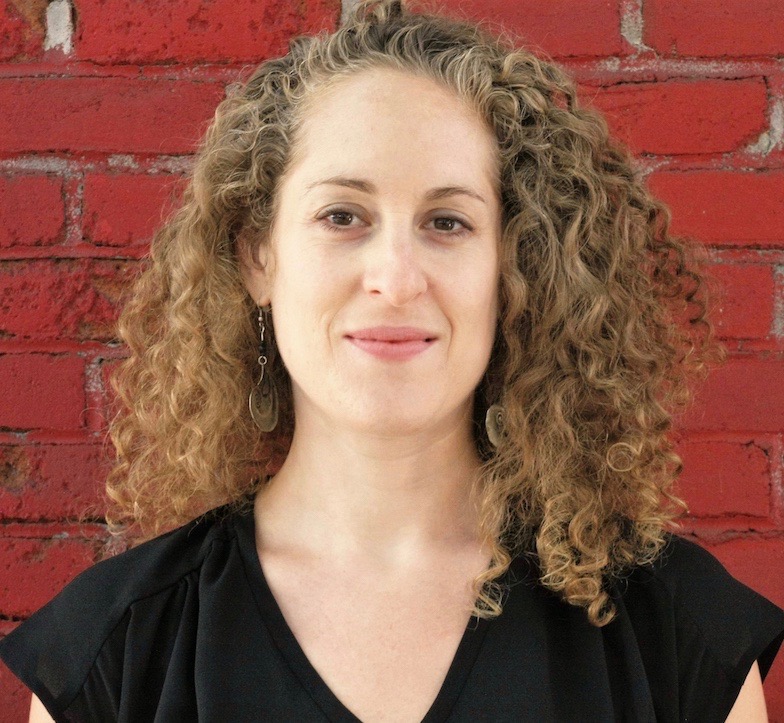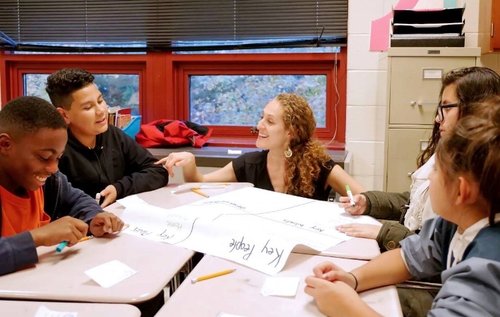Participation for Education and Change
Clara Waloff Parker ’94 reflects on learning by doing at Miquon, and over the course of her career
Her parents’ experience with suburban Philadelphia’s sprawling public school system led them to seek out a Progressive education in an intimate setting for their three daughters, which is how Clara Waloff Parker came to attend The Miquon School.
“I was, and my sisters were too, profoundly impacted and shaped at Miquon, becoming who we are through the choices we made in terms of school and study,” Parker explains.
Parker, who graduated in 1994, followed in the footsteps of her older sister Natasha Waloff Baglin, ahead by four years, and was joined by her twin sister, Mariel Waloff Carr. The three attended Miquon from Kindergarten through sixth grade, continuing at Friends Select School in Philadelphia, where they completed high school.
Parker laughs when discussing these years because her mother, Wendy Buckingham, was the librarian at Miquon and an English teacher at Friends Select, and she feels as if the four women in the family were educated together.
“I got my master’s degree from Bank Street College of Education in Manhattan,” Parker says. “Studying education made me realize a lot about Miquon’s pedagogy and all the hands-on things we did and all the time we spent outdoors, which actually was our classroom.”
She recalls learning addition and subtraction using a bowl of Cheerios. “We would count them out, line them up, and through that, learn how to add and subtract. If we got it right, we got to eat the cereal,” she says with a chuckle. “Clearly, it worked, and we learned our arithmetic and moved on.”

Another project that comes to mind was writing a 16-page children’s book.
“We wrote the story over several weeks, created the artwork, founded a publishing company, wrote author bios for the book jacket . . . we did the creative part and also the business part, learning all the steps it takes to write and publish a book.
She also remembers putting on plays–and especially, composing music for her fifth grade play, A Midsummer Night’s Dream, a project through which the students learned the business of play production.
“Interdisciplinary experiences, where you learn a range of skills outside of one content area, are so valuable,” she adds.
Parker says the curriculum was used to reinforce lessons students gained through the many hands-on activities at Miquon.
“We learned by doing. . . by doing all those things we didn’t get to do elsewhere.”
What is Progressive education?
Parker cites John Dewey and his book, Experience and Education, in which he stresses that education happens through experience and in relationships and should be based in a young person’s experience of the world.
“Young people learn better when they’re interacting with materials rather than just learning rote memorization, and a lot of that is scientifically proven,” she says. “This all connects to the Miquon experience. . . to do, create, test things out.”
Paulo Freire is another educator Parker mentions. His rejection of the form of education he considered “banking,” in which a teacher deposits knowledge into a child’s head and then the child regurgitates it, is one of his best-known theories, outlined in his book Pedagogy of the Oppressed.
“Progressive education says the opposite,” says Parker. “Everyone comes with full experience, imagination and knowledge. It’s the teacher’s job to determine how to expand and make connections with what [students] already know to these new things.”
Connecting the dots
Parker’s individuality was further nurtured at New York University, where she designed her own undergraduate program as she says, “studying everything I’m doing now.
“I studied community education, the arts, Latin American studies and social change through the Gallatin interdisciplinary seminars and other classes held throughout the university. [At Gallatin] you could map out a specific course of study while taking classes in the business school, for example,” she adds.
Professionally, Parker incorporated all of her educational experiences into a career. She has served 13 years on the staff of the El Puente — a community development organization focussed on education, the arts, and social justice. In 2012 she was asked to join the newly-formed Global Justice Institute, a program within El Puente where she eventually became director.
El Puente Global Justice Institute (GJI) codifies 36 years of El Puente’s community development pedagogy and methodology by training community leaders within the organization and from across the globe. GJI has hosted groups from California, Washington State, Pittsburgh, France, Northern Ireland, Denmark, and beyond who are working in the areas of arts for social justice, cultural organizing, community and youth development, and environmental advocacy. These groups are trained by the Global Justice Institute to translate El Puente’s best practices to their own work, and ultimately, transform their communities.
 I believe that meaningful personal and community development are driven by meaningful participation, and that the deeper the participation, the more elevated the potential for change. –www.claraparker.com
I believe that meaningful personal and community development are driven by meaningful participation, and that the deeper the participation, the more elevated the potential for change. –www.claraparker.com“I came to realize before graduate school that the work I had done in arts, youth development, and community organizing were all connected. The through line for me is education,” says Parker.
In this role and through a consulting firm she founded, Clara Parker LLC, Parker sees herself adding to the work done by her forebears –putting community organizing theory into practice by educating others. In addition to training, she has developed curriculum and practical tools that include various methods for implementing change at the grass roots level–including widely-used techniques like participatory action research and El Puente’s framework for arts for social justice, “the Creative Justice Approach.”
According to Parker, these approaches take concepts from the research level to the people who are actually implementing change in the community.
Much like her time at Miquon, Clara strives for experiential participation as the means to an end. She creates hands-on opportunities and provides tools for community leaders to use their own lives as a way to better understand the world and achieve their goals for change.
“It is a lot more than sitting in a classroom taking tests–[education] takes place in every part of life. When you work with any part of people, there is learning happening, and any change has to start from learning.”